Abstract
OBJECTIVES. This study examined the likelihood of smoking cessation in smokers with a prior history of alcoholism. METHODS. Data came from an epidemiologic study of 1007 young adults, randomly selected from those insured in a large health maintenance organization (HMO) in southeast Michigan. Cox proportional hazards models with time-dependent covariates were used to estimate the hazards ratios of quitting in smokers with current and past alcoholism, with smokers with no history of alcoholism as a reference. Sex, race, and education were controlled. RESULTS. Smokers with active alcoholism in the preceding year were 60% less likely to quit than were smokers with no history of alcoholism. In contrast, smokers whose alcoholism had remitted were at least as likely to quit as smokers with no history of alcoholism. Compared with persistent alcoholism, remission of alcoholism was associated with more than a threefold increase in the likelihood of subsequent smoking cessation. CONCLUSIONS. The findings suggest that discontinuation of alcoholism might increase the potential for successful smoking cessation.
Full text
PDF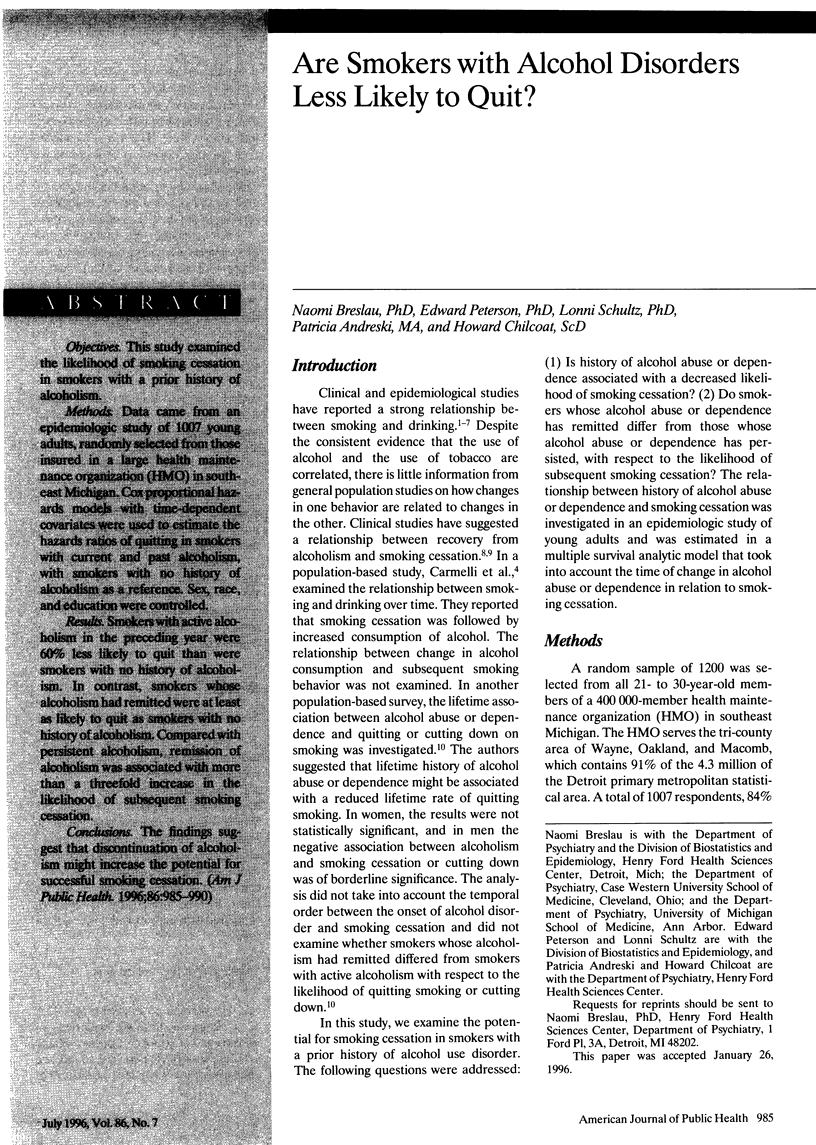
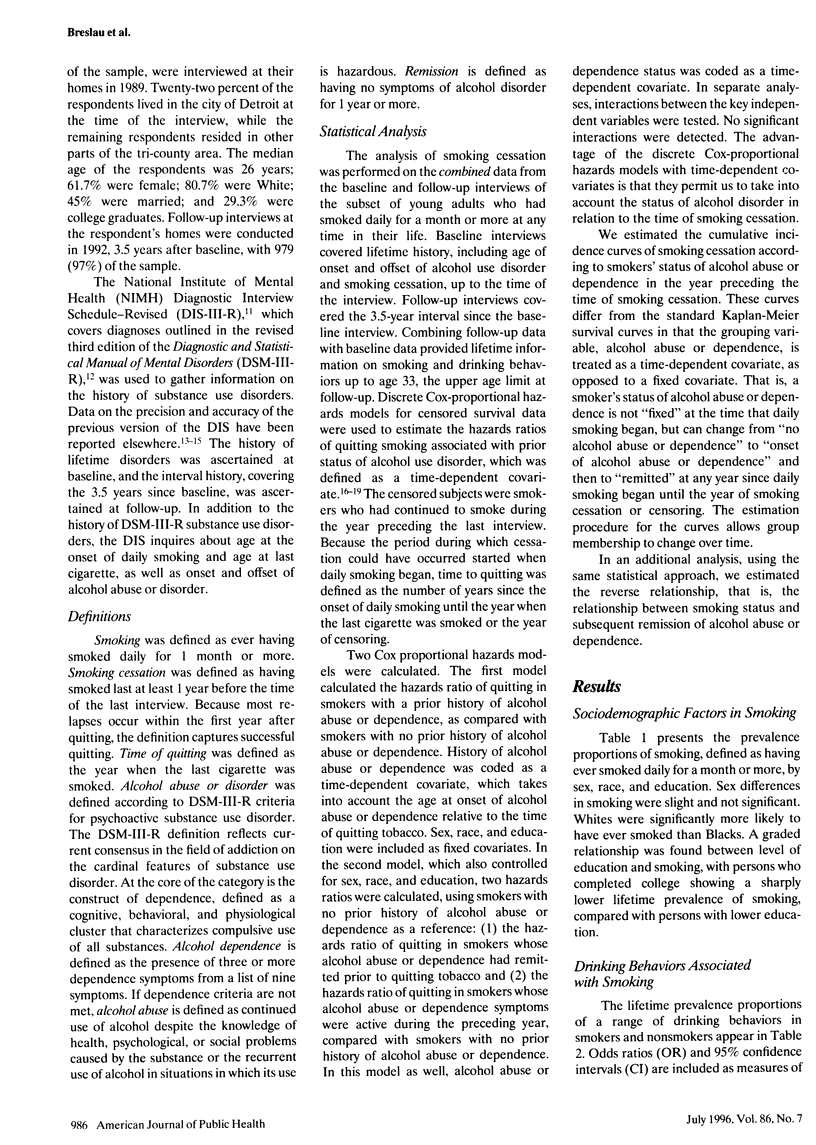
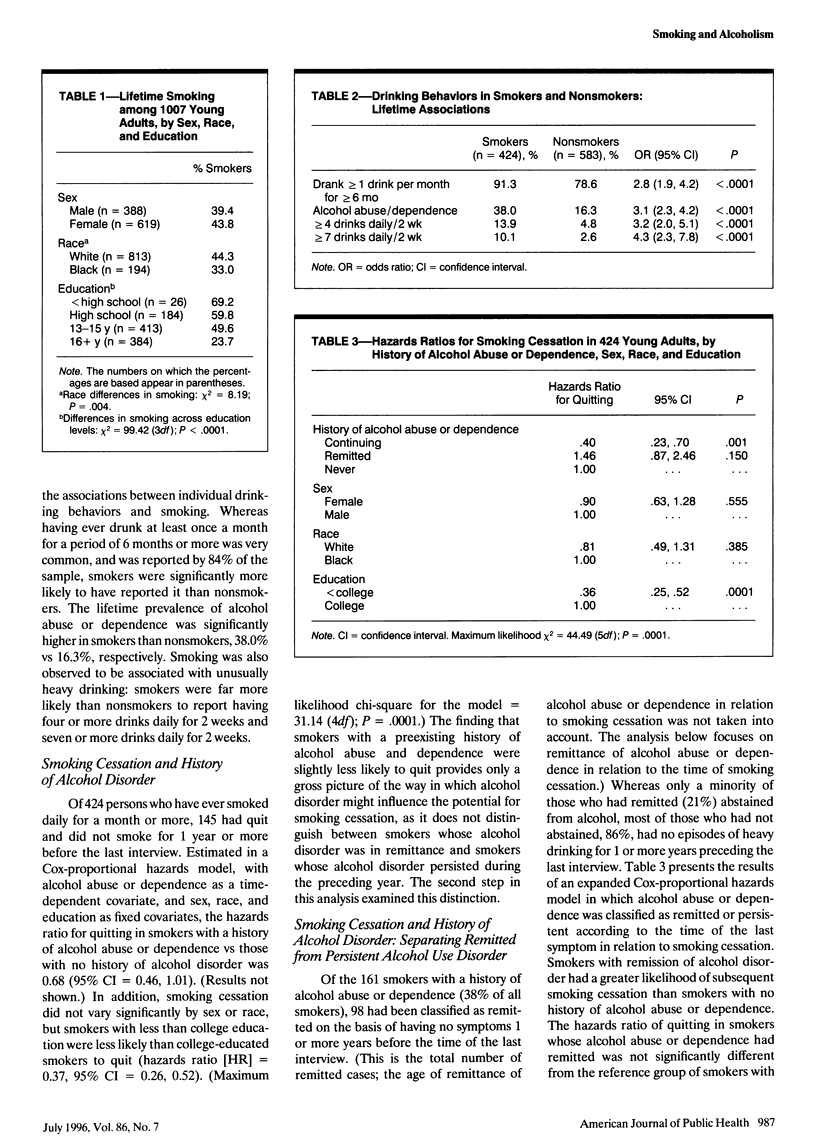
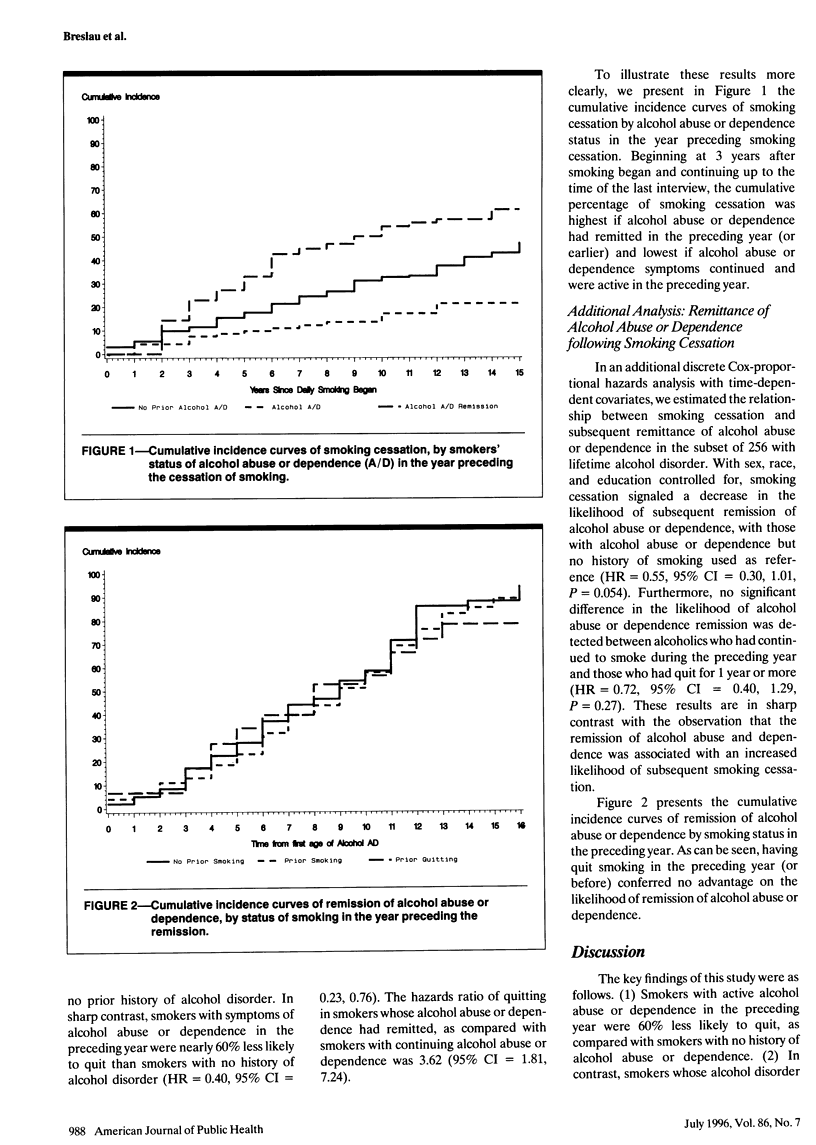
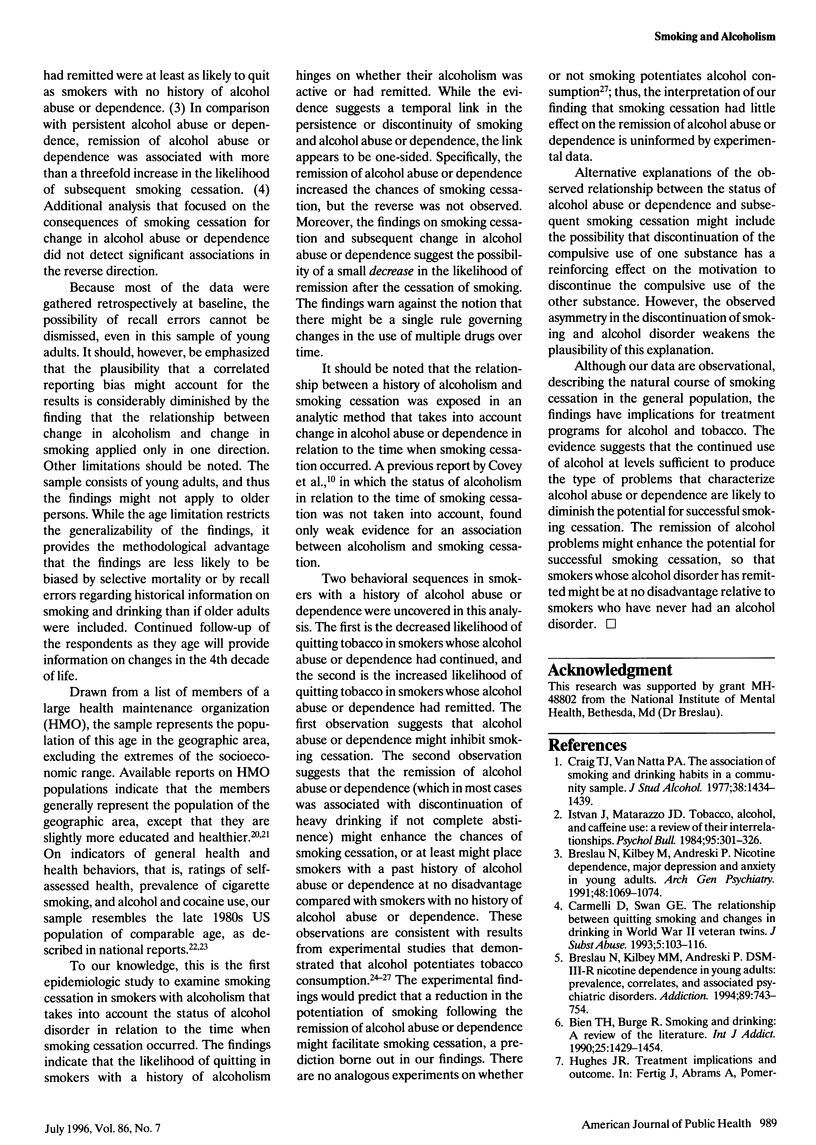
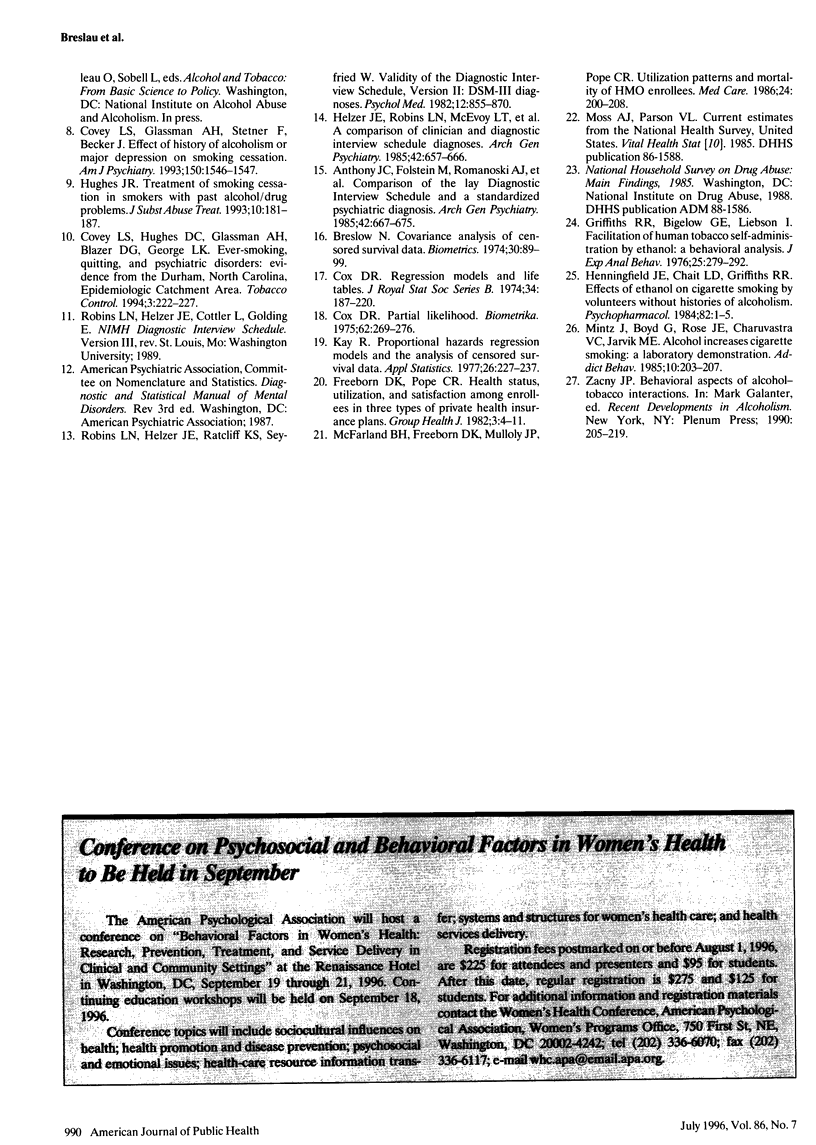
Selected References
These references are in PubMed. This may not be the complete list of references from this article.
- Anthony J. C., Folstein M., Romanoski A. J., Von Korff M. R., Nestadt G. R., Chahal R., Merchant A., Brown C. H., Shapiro S., Kramer M. Comparison of the lay Diagnostic Interview Schedule and a standardized psychiatric diagnosis. Experience in eastern Baltimore. Arch Gen Psychiatry. 1985 Jul;42(7):667–675. doi: 10.1001/archpsyc.1985.01790300029004. [DOI] [PubMed] [Google Scholar]
- Bien T. H., Burge R. Smoking and drinking: a review of the literature. Int J Addict. 1990 Dec;25(12):1429–1454. doi: 10.3109/10826089009056229. [DOI] [PubMed] [Google Scholar]
- Breslau N., Kilbey M. M., Andreski P. DSM-III-R nicotine dependence in young adults: prevalence, correlates and associated psychiatric disorders. Addiction. 1994 Jun;89(6):743–754. doi: 10.1111/j.1360-0443.1994.tb00960.x. [DOI] [PubMed] [Google Scholar]
- Breslau N., Kilbey M., Andreski P. Nicotine dependence, major depression, and anxiety in young adults. Arch Gen Psychiatry. 1991 Dec;48(12):1069–1074. doi: 10.1001/archpsyc.1991.01810360033005. [DOI] [PubMed] [Google Scholar]
- Breslow N. Covariance analysis of censored survival data. Biometrics. 1974 Mar;30(1):89–99. [PubMed] [Google Scholar]
- Carmelli D., Swan G. E., Robinette D. The relationship between quitting smoking and changes in drinking in World War II veteran twins. J Subst Abuse. 1993;5(2):103–116. doi: 10.1016/0899-3289(93)90055-g. [DOI] [PubMed] [Google Scholar]
- Covey L. S., Glassman A. H., Stetner F., Becker J. Effect of history of alcoholism or major depression on smoking cessation. Am J Psychiatry. 1993 Oct;150(10):1546–1547. doi: 10.1176/ajp.150.10.1546. [DOI] [PubMed] [Google Scholar]
- Craig T. J., Van Natta P. A. The association of smoking and drinking habits in a community sample. J Stud Alcohol. 1977 Jul;38(7):1434–1439. doi: 10.15288/jsa.1977.38.1434. [DOI] [PubMed] [Google Scholar]
- Freeborn D., Pope C. Health status, utilization, and satisfaction among enrollees in three types of private health insurance plans. Group Health J. 1982 Winter;3(1):4–11. [PubMed] [Google Scholar]
- Griffiths R. R., Bigelow G. E., Liebson I. Facilitation of human tobacco self-administration by ethanol: a behavioral analysis. J Exp Anal Behav. 1976 May;25(3):279–292. doi: 10.1901/jeab.1976.25-279. [DOI] [PMC free article] [PubMed] [Google Scholar]
- Helzer J. E., Robins L. N., McEvoy L. T., Spitznagel E. L., Stoltzman R. K., Farmer A., Brockington I. F. A comparison of clinical and diagnostic interview schedule diagnoses. Physician reexamination of lay-interviewed cases in the general population. Arch Gen Psychiatry. 1985 Jul;42(7):657–666. doi: 10.1001/archpsyc.1985.01790300019003. [DOI] [PubMed] [Google Scholar]
- Henningfield J. E., Chait L. D., Griffiths R. R. Effects of ethanol on cigarette smoking by volunteers without histories of alcoholism. Psychopharmacology (Berl) 1984;82(1-2):1–5. doi: 10.1007/BF00426371. [DOI] [PubMed] [Google Scholar]
- Hughes J. R. Treatment of smoking cessation in smokers with past alcohol/drug problems. J Subst Abuse Treat. 1993 Mar-Apr;10(2):181–187. doi: 10.1016/0740-5472(93)90043-2. [DOI] [PubMed] [Google Scholar]
- Istvan J., Matarazzo J. D. Tobacco, alcohol, and caffeine use: a review of their interrelationships. Psychol Bull. 1984 Mar;95(2):301–326. [PubMed] [Google Scholar]
- McFarland B. H., Freeborn D. K., Mullooly J. P., Pope C. R. Utilization patterns and mortality of HMO enrollees. Med Care. 1986 Mar;24(3):200–208. doi: 10.1097/00005650-198603000-00002. [DOI] [PubMed] [Google Scholar]
- Mintz J., Boyd G., Rose J. E., Charuvastra V. C., Jarvik M. E. Alcohol increases cigarette smoking: a laboratory demonstration. Addict Behav. 1985;10(3):203–207. doi: 10.1016/0306-4603(85)90001-2. [DOI] [PubMed] [Google Scholar]
- Robins L. N., Helzer J. E., Ratcliff K. S., Seyfried W. Validity of the diagnostic interview schedule, version II: DSM-III diagnoses. Psychol Med. 1982 Nov;12(4):855–870. doi: 10.1017/s0033291700049151. [DOI] [PubMed] [Google Scholar]


